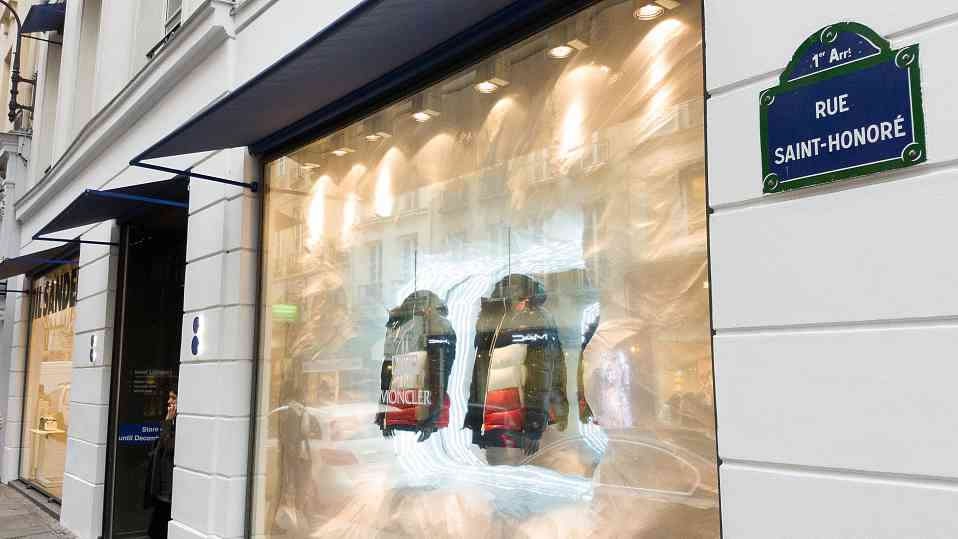
Opinions
15:34, 20-Dec-2017
Opinion: Why I am not a dedicated follower of fashion
Guest commentary by André Lamberz

It is said that the best die young. That, at least to a certain extent, is shown by how much the fashion world is affected by an example of the Paris fashion label and trend-boutique Colette on Rue Saint-Honoré, closing its doors after just 20 years this month. The news was a shock to the fashion world, as the store had become a pilgrimage to trend-hunters.

A general view at the 'Colette' store on Rue du Faubourg Saint Honore on December 6, 2017 in Paris, France. / VCG Photo
A general view at the 'Colette' store on Rue du Faubourg Saint Honore on December 6, 2017 in Paris, France. / VCG Photo
Colette Rousseaux, the bustling company founder, did not lack fans. Forbes described her shop as "the trendiest store in the world," and fashion czar Karl Lagerfeld said that he occasionally visited the boutique because there are things to find nobody else offers.
In addition, Colette Rousseaux proved to be a master strategist forming collaborations with big names in the industry. The result: disposable lighters bearing the label of major fashion designers, in Asia selling between 0.15 and 0.30 US dollars, were priced at 17 US dollars, alongside coffee mugs for a mere 41 US dollars. Personally I do not visit clothing stores where I may ask the tentative question: “…and this is something people are wearing now?” Only to get the answer: “Of course! But only those who can afford it!”
Label addicts and fashion industry - a match made in heaven

Fashion blogger Kristina Bazan wears a Chloe cape, dress and bag at the Chloe show on day 6 of Paris Collections: Women on March 08, 2015 in Paris, France. / VCG Photo
Fashion blogger Kristina Bazan wears a Chloe cape, dress and bag at the Chloe show on day 6 of Paris Collections: Women on March 08, 2015 in Paris, France. / VCG Photo
Let’s bring on the carpet. Clothes, or apparel if you want, have very basic functions. Anthropologists claim that mankind started using cloth around 75,000 years ago to protect people against harmful environmental and climate influences. Today the meaning that clothing has in the life of an individual is very different. It has become dependent on the social environment, and more often its role defines the individual.
For someone like me, it is an unimportant externality or pragmatic commodity, while for others it is an essential part of their life. Looking around me, sometimes the saying “the simpler the brain, the more expensive the thread” comes to mind. The reason why France has developed into the center of extremely expensive clothing may stem from customs at the court of Louis XIV of France, which obliged noblemen to attend events almost every day in a new outfit, so the king could keep an eye on them.
Clothes make people and someone else filthy rich and famous

A model presents a creation by P.O.C. Papa Omisore Clothing, during the Lagos Fashion and Design Week in Lagos, on October 26, 2017. / VCG Photo
A model presents a creation by P.O.C. Papa Omisore Clothing, during the Lagos Fashion and Design Week in Lagos, on October 26, 2017. / VCG Photo
Put your hand on your heart! Would you ever ask your 80-something-year-old grandfather for advice on what to wear to a special event, or even in daily life? No problem for modern-day fashion dictators.
At the helm you’ll find Karl Otto Lagerfeld (84), a German fashion designer, creative director, and photographer. He is the old man in Skinny-Fit suit trousers, known for his white pony tail, day and night dark sunglasses, wearing motorcycle gloves due to his germophobia.
Besides, he is famous for many weird quotes like: "Anyone who wears sweatpants has lost control of his life." Sorry Karl, under no circumstances would I allow you to dictate my apparel. However, that does not mean I will go out wearing sackcloth and ashes, a clown costume at a funeral, or a T-shirt for a job interview.
When young fashion bloggers burst into tears
Finally let’s cast a light on what I call the dark net of the multibillion fashion industry. An ugly example is Georgio Armani (83), owner of an estimated 7 billion-euro empire (6,700 employees, nearly 2,500 boutiques), who donated himself a kind of museum at his birthday party, filled with the best of four decades of fashion: sketches, fashion unique, and jewelry. For the "Silo," a former Nestlé factory, he paid 50 million euros.
The Italian Fashion icon and billionaire, produces his overpriced luxury jeans in Cambodia with what I would describe as “slave labor,” and under conditions the NGO Human Rights Watch described as failing to protect garment workers.

Women work in a clothes factory in Phnom Penh, Cambodia March 28, 2016. Picture taken March 28, 2016. / VCG Photo
Women work in a clothes factory in Phnom Penh, Cambodia March 28, 2016. Picture taken March 28, 2016. / VCG Photo
Three years ago, the Norwegian newspaper Aftenposten sent a couple of cheerful, young "fashion bloggers" to Cambodia, to work in one of the factories for a whole day. After the experience I think they could now give their fellow Shopaholic Fashionista a speech about how young people in poverty make a multi-billionaire even richer. The usual statement that consumers often make that they "did not know about all this" is hard to say here, because this has been going on for years, and at least the British, Scandinavian, and Australian press have reported on the subject.
Two of the bloggers who worked in the factory for just one day burst out in tears during the interview about their experience. What they found was “inhumane” conditions, people doing 12 hours of needle work per day, 6 days a week and empty promises of improvement.
Against this backdrop of workers campaigning for 168 US dollars of minimum wage per month, and protesting against working conditions in the garment factories, I must confess I couldn’t care less over the closure of another high fashion store anywhere in the world.
(André Lamberz is a former senior editor for Bild am Sonntag, contributor to various publications of the Axel Springer Verlag, Berlin and now a freelance journalist and correspondent in Bangkok, Thailand. The article reflects the author’s opinion, and not necessarily the views of CGTN.)

SITEMAP
Copyright © 2018 CGTN. Beijing ICP prepared NO.16065310-3
Copyright © 2018 CGTN. Beijing ICP prepared NO.16065310-3